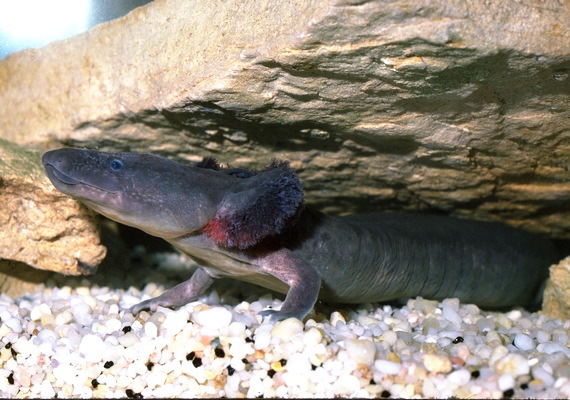When you first hear the name mudpuppy, the first image that might pop into your mind is of a puppy rolling around in the mud. However, this is the farthest from what a mudpuppy actually is.
It’s easy to get the wrong idea as many people style it as “mud puppy” instead of “mudpuppy.”
Also known as waterdogs, mudpuppies aren’t mammals but are actually amphibians. They’re a type of salamander that lives in freshwater.
In this article, you’ll know about mudpuppies, what species they are, what they eat, if you can bring them home and how to take care of them.
Let’s get started.
What is a Mudpuppy?

A mudpuppy or Necturus maculosus is a type of salamander that is commonly found in North America. These amphibians get their name from their habit of spending most of their time in the water, where they are well-camouflaged among the mud and debris.
Mudpuppies can grow to be up to 16 inches long, and they have external gills that allow them to breathe underwater.
Mudpuppies are found in a variety of habitats, including ponds, streams and lakes. They are most commonly seen during the spring and summer months when they come to the surface to mate. mudpuppies are nocturnal animals, and they spend most of their time hiding under rocks or logs.
What Does a Mudpuppy Look Like?
As their name suggests, mudpuppies are well-camouflaged in their aquatic habitats. These amphibians have brown or black skin, with dark spots or mottling. They also have long bodies and tails, and they typically grow to be between 8 and 16 inches long. mudpuppies have four legs, but their hind legs are shorter than their front legs.
mudpuppies have external gills, which are located behind their heads. These gills allow them to breathe underwater. mudpuppies also have well-developed eyesight, and they can see both in the water and on land.
Are Mudpuppies Endangered?
According to the Encyclopedia of Life, the common mudpuppy is not considered as an endangered species. However, due to a variety of factors, including habitat loss and water pollution, mudpuppies are declining in some parts of the world.
These amphibians are also threatened by predators, such as fish, snakes and turtles. Mudpuppies are protected by law in some states, and efforts are being made to restore their populations.
What Does a Mudpuppy Eat?
Mudpuppies are carnivores and they eat a variety of small animals which including insects, worms and crustaceans. These amphibians use their long tongues to snatch prey from the water. They will also consume carrion if it is available.
What is the Life Cycle of a Mudpuppy?
Mudpuppies typically live for 10 to 12 years in the wild. These amphibians reach sexual maturity at 3 to 5 years of age.
Mating takes place in the spring and summer months. During this time, male mudpuppies will compete for the attention of female mudpuppies. Once a female has been selected, the pair will mate.
The female mudpuppy will lay her eggs in a hidden location, such as under a rock or log. She will typically lay between 10 and 30 eggs. The eggs hatch after approximately two weeks.
The young mudpuppies are independent from birth. They will begin to feed on small insects and other invertebrates soon after they hatch. They tend to grow quickly, and they can reach their full size within a year.
Does a Mudpuppy Bark?
Mudpuppies do not bark, but they can make a grunting noise when they are excited or agitated.
Do Mudpuppies Bite?
Mudpuppies have sharp teeth and they can bite if they feel threatened. However, these amphibians are not considered to be dangerous to humans.
How to Care for a Mudpuppy

If you are lucky enough to find a mudpuppy, you will need to provide it with the proper care and become a responsible pet owner. However, make sure that it’s legal to own a mudpuppy in your state.
These amphibians should be kept in an aquarium that is at least 10 gallons in size. The tank should have a tight-fitting lid, and it should be equipped with a filter and an air stone.
The water in the aquarium should be clean and well-filtered. Mudpuppies prefer water that is cool or room temperature. The pH of the water for mudpuppies should be between 6.0 and 8.0.
These amphibians are carnivores and they will eat a variety of small animals, including insects, worms and crustaceans. You can purchase live food at your local pet store, or you can collect it from the wild. It is important to offer your mudpuppy a variety of food to ensure that it gets the nutrients it needs.
Note that mudpuppies are nocturnal animals so they prefer to sleep during the day. Their home should have rocks or logs they can hide in and sleep under.
Mudpuppies are social animals and they should be kept in pairs or small groups. These amphibians are typically peaceful, but they can become aggressive if they feel threatened.
Pets are a wonderful addition to the family. But unlike owning cats or dogs, if you are interested in keeping mudpuppies as pets, you should contact your local wildlife agency to find out if it is legal to do so in your state or province. These amphibians can make excellent pets for people who are willing to provide them with the proper care.

